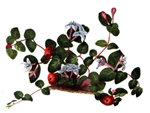
Squaw Vine
Introduction
This fact sheet provides basic information about Squaw Vine. Wintergreen is a perennial evergreen shrub with thin, creeping stems from which leathery leaves with toothed, bristly margins arise. It is a low-growing plant native to eastern North America and usually is found in woodland and exposed mountainous areas. Its small, waxy, white or pale pink flowers bloom in late summer, developing a scarlet fruit. The aromatic leaves and fruits are edible.American Indians reportedly used wintergreen for treating back pain, rheumatism, fever, headaches, and sore throats. The plant and its oil have been used in traditional medicine as an anodyne, analgesic, carminative, astringent, and topical rubefacient.
Wintergreen oil is obtained by steam distillation of the warmed, water-macerated leaves. It is used interchangeably with sweet birch oil or methyl salicylate for flavoring foods and candies. The highest amount of methyl salicylate typically used in candy flavoring is 0.04%.
Wintergreen berries have been used to make pies. A tea made from the leaves was used as a substitute for tea ( Camellia sinensis ) during the Revolutionary War. The tea has been used to relieve cold symptoms and muscle aches.
Common Names
Squaw Vine, Wintergreen, Canada Tea, Checkerberry, Deerberry, Groundberry, Hillberry, Mountain Tea, Spiceberry, Wax Cluster, Boxberry, Tea Berry, PartridgeberryLatin Names
Gaultheria procumbensWhat It Is Used For
- In addition to being used as a flavoring, wintergreen and its oil have been used in topical analgesic and rubefacient preparations for the treatment of muscular and rheumatic pain. However, research reveals no clinical data regarding the use of wintergreen for any condition.
How It Is Used
Because of toxicity concerns, follow the suggested manufacturer's oral or topical dosage form regimen: 1 teaspoon (5 mL) of wintergreen oil is equivalent to approximately 7000 mg of salicylate or 21.5 adult aspirin tablets.What the Science Says
- Research reveals no clinical data regarding the use of wintergreen for any condition.
Side Effects and Cautions
- Wintergreen oil can induce vomiting, and in some cases, death. Counsel patients about the clinical manifestations of methyl salicylate poisoning (eg, tinnitus, acid-base disturbance, endocrine abnormalities, fluid and electrolyte imbalances, CNS toxicity).
Sources
- Drugs.Com Web site. Accessed on February 7, 2009.
- From Wikipedia, the free encyclopedia. Accessed on February 7, 2009.






